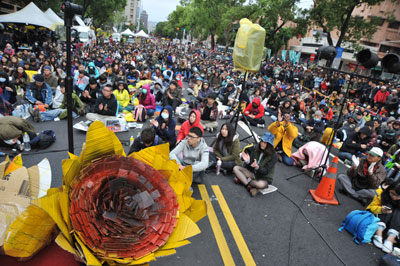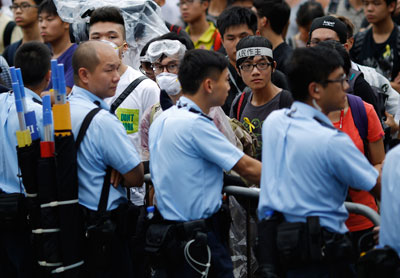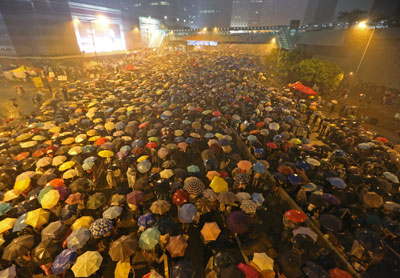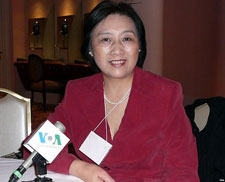
Taiwan journalists feel pressure as elections approach
Political tensions are rising in Taiwan ahead of local and municipal elections due at the end of November. The vote is expected to test the popularity of the ruling Kuomintang Party (KMT), which advocates greater integration with China and which earlier this year sparked protests when it tried to pass a new economic cooperation deal…

Hong Kong’s media battlefield
Hong Kong’s pro-democracy protests are among the best covered in history. The city is saturated with print, broadcast, and social media, traveling across some of the best networks on earth. Its citizens are among the most connected in the world. And for all the media’s flaws, consumers expect them to deliver.

Journalist in Hong Kong? These tips will keep you safer and help you do your best job
We have been receiving reports of harassment and the use of force directed toward journalists covering the demonstrations in Hong Kong. Most of the incidents came over the weekend with the government’s ill-advised attempt to end the protests with police force. But with tensions building today, more clashes with police seem possible.

Amid Hong Kong protests, journalists battle misperceptions of press freedom
EDITOR’S NOTE: As pro-democracy protests in Hong Kong intensify ahead of China’s National Day on Wednesday, some reporters have been caught in the melee. But for Hong Kong’s journalists, there is more at stake than run-ins with the riot police.
Conditions increasingly restrictive for foreign correspondents in China
When China hosted the summer Olympics in 2008 it promised greater press freedom, but six years later conditions for international journalists are increasingly more restrictive, as evidenced by a report released today by the Foreign Correspondents’ Club of China.
Ever broader restrictions handed down for China’s reporters
Yet another set of rules restricting the work of journalists in China takes the concept of “overbroad” to new heights. According to guidelines made public Tuesday by the official state news agency Xinhua, the new rules cover various “information, materials, and news products that journalists may deal with during their work, including state secrets, commercial…
Conditions for international reporters deteriorating in China
The Foreign Correspondents’ Club of China released at the end of May its annual report on conditions for international journalists working in the country. As we have done in the past, we’re posting this year’s report as a PDF. The takeaway is that conditions have certainly not gotten better and many feel they have gotten…
Ilham Tohti’s daughter fights for his freedom
At first glance, 19-year-old Jewher Ilham may seem like a typical college student. As she clutched her smart phone, the face of a cat imprinted on the cover peered through her fingers. She spoke in short sentences with little pause. Her thoughts pulled her in various directions as she spoke about her love for dance,…

Chinese journalist Gao Yu is missing
On April 15, 1989, Hu Yaobang died. Hu had been general secretary of the Communist Party from 1982 to 1987, and recognized for his leanings toward economic reform in China. His death led to demonstrations around China, some of them in Tiananmen Square. On June 4, 1989, Tiananmen became the focus of the government’s wrath, and…
FCCC survey finds China abuses press card, visa process
The Foreign Correspondents’ Club of China (Beijing) published the findings of its annual visa survey last week. The findings are grim but come as no surprise following the Chinese government’s showdown late last year with members of the foreign press.